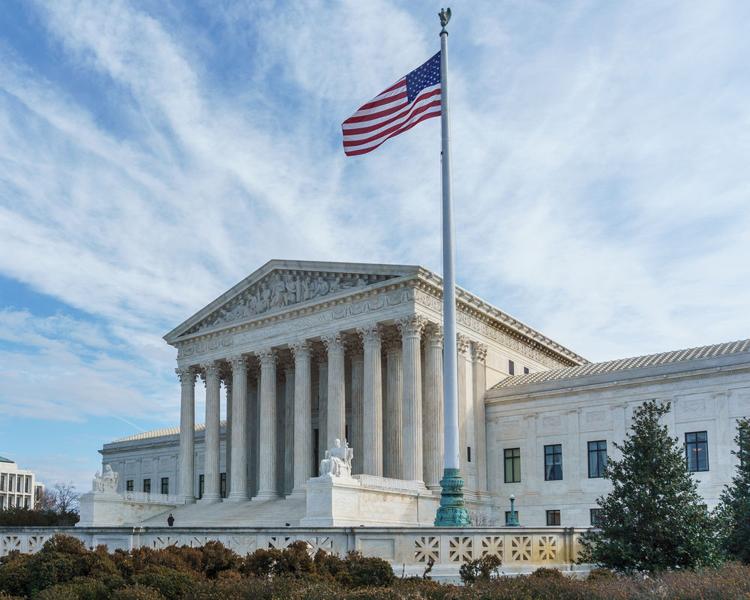U.S. Supreme Court won’t intervene in Florida felons voting case, barring 85,000 from primary

The United States Supreme Court Building in Washington, D.C.
(The Center Square) – The U.S. Supreme Court declined requests Thursday to intervene in Florida’s year-long legal battle over restoring felons’ voting rights.
As a result, at least 85,000 registered felons will not be permitted to vote in the state’s Aug. 18 primary – the same day the case will be heard in the U.S. 11th Circuit Court. Hundreds of thousands of felons potentially could be barred from November’s election if a ruling is not issued by Oct. 7, the registration deadline.
The court issued its decision without comment, typical in responding to emergency hearing applications, but Justice Sonia Sotomayer, joined by justices Ruth Bader Ginsberg and Elena Kagan, registered dissent in a seven-page opinion.
“Plaintiffs have raised serious claims, some of which the 11th Circuit already found likely to succeed,” Sotomayor wrote. “Because the parties’ rights and the legal framework had been well established, it was error for the 11th Circuit to reverse course in an unexplained stay order right before an election.”
Campaign Legal Center and Southern Poverty Law Center (SPLC) attorneys last week filed U.S. Supreme Court hearing requests after the 11th Circuit on July 1 announced it would hear Florida’s challenge to U.S. District Judge Robert Hinkle’s May 24 ruling.
The court also granted Gov. Ron DeSantis’ motion for a stay, suspending Hinkle’s October injunction that prevented the state from filing appeals to block eligible felons from voting while the case is being deliberated.
In their response, filed Tuesday, attorneys for the state argued “all Floridians will be irreparably harmed if the district court’s patently erroneous injunction is reinstated, enabling hundreds of thousands of ineligible voters to take part in the upcoming elections, one of which is only a month away.”
Nearly 65 percent of Florida voters in November 2018 approved Amendment 4, which restored voting rights for felons, excluding those convicted of murder and sexual assault, after “completing sentences.”
During the 2019 legislative session, the Legislature adopted Senate Bill 7066 as enabling legislation, which interpreted “completing sentences” to mean paying all legal obligations, including court fees, fines and restitution.
SB 7066 was challenged by an array of groups, launching a year-long legal battle that culminated in an eight-day trial in Hinkle’s Tallahassee courtroom in May.
Throughout the proceedings, Hinkle was critical of the state’s inability to create a process to determine how much felons owed and their voting status.
In his May 24 decision, Hinkle called SB 7066 a “pay-to-vote system” that imposes “a tax by any other name” and required the state to ascertain how much a felon owes within 21 days of a status request or voting rights are automatically restored.
In February, a three-judge 11th Circuit panel unanimously upheld Hinkle’s October ruling that SB 7066 denied voting rights of felons “genuinely unable” to pay court costs and retained his injunction that prevented the state from barring 17 plaintiffs from voting.
Hinkle later granted class certification for one consolidated case, Jones v. DeSantis, meaning the ultimate ruling would apply to all of Florida’s 1.4 million potentially eligible voters, of which an estimated 774,000 were projected to register and vote in November.
In her rebuke, Sotomayer noted the Supreme Court now has issued four recent rulings restricting poll access.
In April, it dismissed a lower court’s order to give Wisconsin voters six extra days to submit absentee ballots.
In June, it denied Texas Democrats’ request to allow millions of voters under age 65 to get “no-excuse” mail-in ballots for the state’s July 14 primary and Nov. 3 general election.
This month, it allowed three Alabama counties to require a copy of the voter’s ID and signatures of two witnesses or a notary to file absentee ballots for the state’s July 14 primary.
“This Court’s inaction” in rejecting the request “continues a trend of condoning disfranchisement,” Sotomayer wrote.

